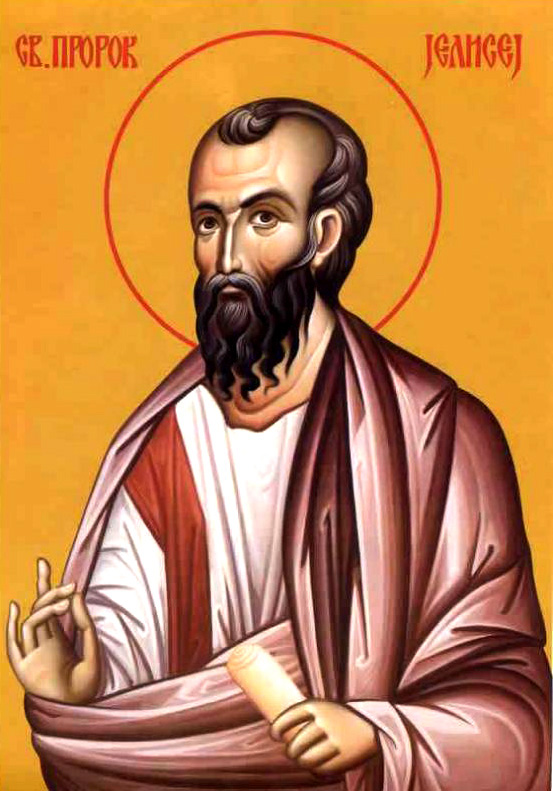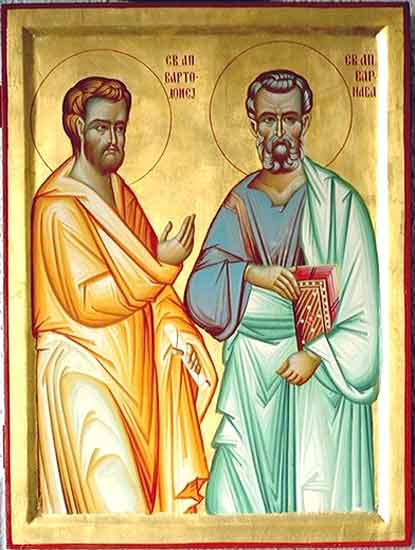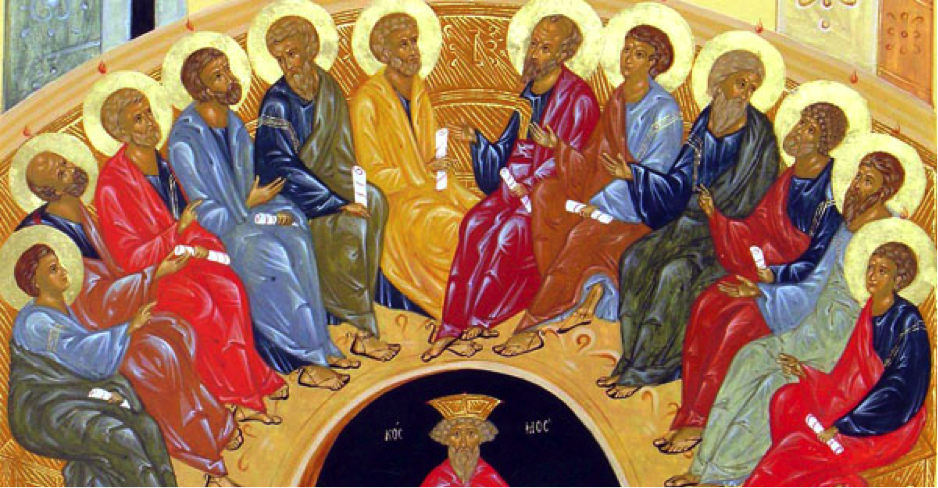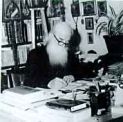Life & Faith
The Holy Prophet Elisseus (Elisha)
 The Prophet Elisseus, the son of Saphat, was from the town of Abel-me-oul and had been a husbandman. In the year 908 B.C., at God's command, the Prophet Elias anointed him to be Prophet in his stead. This happened while Elisseus was plowing his land, having twelve oxen under yoke. Straightway, Elisseus slew the oxen and cooked them, using the wooden plough and the other instruments of husbandry as firewood; then he gave the oxen as food to the people. Bidding farewell to his parents, he followed Elias and served him until the latter was taken up as it were into Heaven (see July 20). When Elisseus received his teacher's mantle and the grace of his prophetic spirit twofold, he demonstrated whose disciple he was through the miracles he wrought and through all that is related of him in the Fourth Book of Kings. He departed full of days and was buried in Samaria, about the year 839 B.C. But even after his death God glorified him; for after the passage of a year, when some Israelites were carrying a dead man for burial and suddenly saw a band of Moabites, they cast the dead man on the grave of the Prophet. No sooner had the dead man touched the Prophet's bones, than he came to life and stood on his feet (IV Kings 13:20-21). Mentioning this, Jesus the Son of Sirach says, "He did wonders in his life, and at his death his works were marvelous" (Ecclus. 48:14). It is because of such marvels that the faithful have reverence for the relics of the Saints (see also Jan. 16). His name means "God is savior."
The Prophet Elisseus, the son of Saphat, was from the town of Abel-me-oul and had been a husbandman. In the year 908 B.C., at God's command, the Prophet Elias anointed him to be Prophet in his stead. This happened while Elisseus was plowing his land, having twelve oxen under yoke. Straightway, Elisseus slew the oxen and cooked them, using the wooden plough and the other instruments of husbandry as firewood; then he gave the oxen as food to the people. Bidding farewell to his parents, he followed Elias and served him until the latter was taken up as it were into Heaven (see July 20). When Elisseus received his teacher's mantle and the grace of his prophetic spirit twofold, he demonstrated whose disciple he was through the miracles he wrought and through all that is related of him in the Fourth Book of Kings. He departed full of days and was buried in Samaria, about the year 839 B.C. But even after his death God glorified him; for after the passage of a year, when some Israelites were carrying a dead man for burial and suddenly saw a band of Moabites, they cast the dead man on the grave of the Prophet. No sooner had the dead man touched the Prophet's bones, than he came to life and stood on his feet (IV Kings 13:20-21). Mentioning this, Jesus the Son of Sirach says, "He did wonders in his life, and at his death his works were marvelous" (Ecclus. 48:14). It is because of such marvels that the faithful have reverence for the relics of the Saints (see also Jan. 16). His name means "God is savior."
Holy Apostles Bartholomew and Barnabas
 Saint Bartholomew, the Apostle. Bartholomew was one of the Twelve Great Apostles. In all probability, it appears that Bartholomew and Nathaniel are one and the same person. He was a companion of the Apostle Philip and Philip's sister, the virgin Mariamna and, for some time, a companion of St. John the Theologian. Bartholomew preached the Gospel first throughout Asia and, after that, in India and finally in Armenia where he died a martyr's death. In Hierapolis, these holy apostles by prayer, caused the death of a large serpent which the heathens kept in their temple and worshipped. In this same city and, by prayer, they restored sight to Stachius who was blind for forty years. It was here that a mob rose up against them and they crucified Philip and Bartholomew (Bartholomew was crucified upside down). At this time, an earthquake occurred in which the evil judges and may people perished. Feeling that this was a punishment from God, many ran to remove the apostles from the crosses but Philip was already dead while Bartholomew was still alive. After this, Bartholomew went to India where he preached and translated the Gospel of St. Matthew into the Indian language.
Saint Bartholomew, the Apostle. Bartholomew was one of the Twelve Great Apostles. In all probability, it appears that Bartholomew and Nathaniel are one and the same person. He was a companion of the Apostle Philip and Philip's sister, the virgin Mariamna and, for some time, a companion of St. John the Theologian. Bartholomew preached the Gospel first throughout Asia and, after that, in India and finally in Armenia where he died a martyr's death. In Hierapolis, these holy apostles by prayer, caused the death of a large serpent which the heathens kept in their temple and worshipped. In this same city and, by prayer, they restored sight to Stachius who was blind for forty years. It was here that a mob rose up against them and they crucified Philip and Bartholomew (Bartholomew was crucified upside down). At this time, an earthquake occurred in which the evil judges and may people perished. Feeling that this was a punishment from God, many ran to remove the apostles from the crosses but Philip was already dead while Bartholomew was still alive. After this, Bartholomew went to India where he preached and translated the Gospel of St. Matthew into the Indian language.
1st Sunday After Pentecost – Orthodox Homily on Sainthood
This Sunday of All Saints confronts us with this radical truth and challenge: God created us to be Saints, “haggioi,” in the Greek, i.e., ‘holy ones.’ St. David says of mankind, “For You have made him a little lower than the angels, And You have crowned him with glory and honor” (Ps. 8:5). Likewise, St. Paul affirms: we are called to “adoptions as sons by Jesus Christ to Himself” that we may know “the glory of His inheritance in the saints” (Eph. 1:4-5, 18).
Two errors are often made with regard to this calling: The first assumes that Sainthood is some intangible ideal that we could never hope to achieve, even with God’s help. This error assumes that Saints are a relic of some distant and legendary past: more myth than reality. We look in us and around us, we listen to what the world says about the ‘holy ones’ in our midst, and in our judging spirit we can be convinced that this must be the case, we find ourselves giving up even before we’ve even started to really achieve anything in terms of a cooperation with the work of the Holy Spirit in our lives.
The second error is to presume on God’s grace with the thinking that no matter, we’re already Saints, thinking that we’ve already ‘arrived.’ Things are ‘comfortable’ the way they are and there’s no need for change, or, we think to ourselves, perhaps unconsciously, “I don’t want to change.” Some think, that God, if He’s loving, will ‘accept’ us as we are no matter what because we are already baptized Christians. This is a gross misunderstanding of what is our calling to life with God and in the presence of His holiness, which demands of us a conforming of ourselves to growth in holiness as integral to our salvation.
Both errors are tragic, in that they distort the truth of what Sainthood really means and its absolute relevance for our own lives, here and now, in this day and age. All are called to a journey with Christ which involves continuous growth in our relationship and communion with God. This relationship and communion with God is never ‘static’, but always in increase or in decrease. It is a hard journey, it that it demands of us that we take up a cross and deny ourselves daily, that we constantly battle our passions, our self-will; it’s a struggle. But without such struggle, we don’t make progress over them; we don’t grow in holiness and how then can we think to stand in the near presence of Him who is so holy that the angels tremble before Him?
When we speak as Orthodox about salvation, we use the term deification (theosis in Greek) to describe our journey of growth in holiness, obedience, and participation in the life of the Holy Trinity. Our journey of deification or theosis, Sainthood, is like standing in the midst of a river with a strong current. The world around us is that river. It’s constantly pulling at us. You can’t stand still: either you’ll quickly be swept away by it –or—with much struggle, you’ll fight the current and head upstream or to the bank for safety. Similarly, we have to fight against our sinful impulses, against the influence of a godless culture; if we wish to make progress in the Kingdom of God and become fit for life with God, we come to see repentance as our aid.
For His part, God desires our transformation into those near angelic beings, the Saints, He’s created us to become, so that we can commune with Him who is Himself holy. He desires we be glorified through relationship with Him, not only for our own healing and salvation, but also so we can witness His life and truth to this corrupt world in such great need.
To this end, St. Paul urges us, to “present your bodies a living sacrifice, holy, acceptable to God…” He continues, saying, “do not be conformed to this world, but be transformed…, that you may prove what is that good and acceptable and perfect will of God” (Rom. 12:1-2)
We come to know this perfect will of God through Christ’s Church. We don’t come to know that will on our own or on our own terms. As Metropolitan Hierotheos puts it, “The Church is the spiritual hospital that heals man… The Church aims to lead man to theosis (deification).” That is her loving purpose, given to her by God as the Body of Christ. In the Orthodox Church Christ founded, we have all the tools we need to work out our salvation and be deified.
Without the Church, we are, as St. Paul says, “like children tossed to and fro and carried about with every wind of doctrine, by the trickery of men, in the cunning craftiness of deceitful plotting…” (Eph. 4:14). In other words, we’re vulnerable to the heretical and false teachings of the world or of those who would interpret the Scriptures or the faith according to their own ideas, we’re vulnerable to false notions of worship and bereft of the Sacraments of healing and growth.
Only those willing to submit to transformation into Christ’s likeness through this healing and progress that He gives us through the Church and her Sacraments, the prayers and tools of the Church continue to advance on the path of deification. This is the ‘recipe’ God entrusted to us through His Church. God, in His great love and mercy for us, offers us the means, to change, to be, as St. Paul puts it, “transformed,” not in the image and likeness of the culture, the world, that’s perishing, but in the likeness of Him who is Eternal Life, Jesus Christ.
In our Orthodox worship, we’re surrounded in the holy icons by the “great cloud of witnesses” of which St. Paul speaks of today. Their example of faith, Christ-likeness, self-denial, bold witness, love, repentance, confession, the cross they bore for Christ in every age, spurs us on in our own struggles for theosis now, in our own age. They serve as living examples to us of the truth, which is also our hope, that God is glorified in His Saints: He delights in adding us to the icons, to that “great cloud of witnesses.”
So, today we examine our own lives. We ask ourselves where we are on this journey to Sainthood. Have we fallen into one of the two errors I mentioned at the beginning of the homily? Do we either disparage our ability to change or do we presume on God’s grace? Have we let anything come between us and God’s holy calling on our souls, any worldly preoccupations or priorities? Are we satisfied with giving God worship once a week? How strong is our daily prayer life? How hard are we struggling to heal from our passions? Do we submit ourselves to Christ and His Church or prefer our own way, our own will? Are we regularly prioritizing our life in God the Holy Trinity above all else?
If we’re to receive our crown, Christ admonishes us today to love and confess Him before all others, just as the Saints have —no matter the costs or the cross. St. Paul gives us this roadmap to our theosis in today’s Epistle, urging us first to, “lay aside… the sin which so easily ensnares us.” In other words, recognize and confess our sins, give them over to Christ, make regular confession. And then, he urges us to persevere, saying: “…Run with endurance the race that is set before us.” We discern with God’s help, often through the Sacrament of Confession, those things we need to turn away from: vices, passions, patterns of behavior—all that “ensnares us.” We may need to actively pray against them and confess them for years, but with that cross of ongoing struggle comes perseverance, growth, healing, and, yes, victory—we don’t stay forever in the same stuck place. Instead, we grow closer to God in His love and truth.
Brothers and sisters, take courage to stay the course; be emboldened by the Saints’ witness and prayers for us. Discipline yourselves to make time to read the life of a Saint each day. As we imitate their example, Christ promises us today: “Everyone who has left houses or brothers or sisters or father or mother or wife or children or lands, for My name’s sake, shall receive a hundredfold, and inherit everlasting life.” May this be our desire: to seek first His Kingdom, life with Him, knowing that God will supply the rest we need. Holy Saints of God, pray for us sinners!
Fr. Robert Miclean
Teaching on the day of Pentecost
Troparion, tone 8: Blessed art Thou, Christ our God, Who didst make the fishermen wise by sending down upon them the Holy Spirit, and through them didst draw the world into Thy net. Lover of men, glory to Thee.
Koniakion, tone 8: When the Most High came down and confused the tongues, He divided the nations, but when He distributed the tongues of fire, He called all to unity. And with one accord we glorify the All-Holy Spirit.
Pentecost: The Descent of the Holy Spirit
 Pentecost (Πεντηκοστή) – the feast day of the Descent of the Holy Spirit
Pentecost (Πεντηκοστή) – the feast day of the Descent of the Holy Spirit
In the Old Testament, Pentecost was the feast that occurred fifty days after Passover. As the Passover feast celebrated the exodus of the Israelites from the slavery of Egypt, so Pentecost celebrated God's gift of the ten commandments to Moses on Mount Sinai.
Abba Justin in dyptich of Saints of the Orthodox Church
 Justin Popovic (1894-1979) was an archimandrite of the Celije monastery, doctor of Theology,professor of the Belgrade University and spiritual elder. Blagoje Popovic, later father Justin, was born in Vranje on April 6 (March 25 after the Julian calendar) 1894 by father Spiridon and mother Anastasia. The Popovic family was pastoral through generations, only Blagoje's father Spiridon was just a sacristan.Blagoje was a youngest child, and he had an older brother Stojadin and sister Stojna.
Justin Popovic (1894-1979) was an archimandrite of the Celije monastery, doctor of Theology,professor of the Belgrade University and spiritual elder. Blagoje Popovic, later father Justin, was born in Vranje on April 6 (March 25 after the Julian calendar) 1894 by father Spiridon and mother Anastasia. The Popovic family was pastoral through generations, only Blagoje's father Spiridon was just a sacristan.Blagoje was a youngest child, and he had an older brother Stojadin and sister Stojna.

